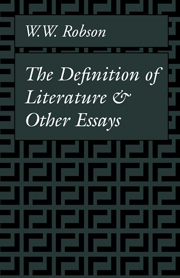Book contents
- Frontmatter
- Contents
- Preface
- Bibliographical note
- 1 The Definition of Literature
- 2 On Liberty of Interpreting
- 3 Evaluative Criticism, and Criticism without Evaluation
- 4 The Novel: a Critical Impasse?
- 5 The Sea Cook: a Study in the Art of Robert Louis Stevenson
- 6 On Kidnapped
- 7 On The Wind in the Willows
- 8 The Present Value of Tennyson
- 9 Robert Frost
- 10 Hopkins and Literary Criticism
- 11 T. S. Eliot: a Poet's Notebook
- 12 I. A. Richards
- 13 Yvor Winters: Counter-romantic
13 - Yvor Winters: Counter-romantic
Published online by Cambridge University Press: 01 June 2011
- Frontmatter
- Contents
- Preface
- Bibliographical note
- 1 The Definition of Literature
- 2 On Liberty of Interpreting
- 3 Evaluative Criticism, and Criticism without Evaluation
- 4 The Novel: a Critical Impasse?
- 5 The Sea Cook: a Study in the Art of Robert Louis Stevenson
- 6 On Kidnapped
- 7 On The Wind in the Willows
- 8 The Present Value of Tennyson
- 9 Robert Frost
- 10 Hopkins and Literary Criticism
- 11 T. S. Eliot: a Poet's Notebook
- 12 I. A. Richards
- 13 Yvor Winters: Counter-romantic
Summary
Forms of Discovery begins with a short introductory chapter, in which Yvor Winters summarises his theory of poetry.
A poem is a statement in words about a human experience; since language is conceptual in nature, this statement will be more or less rational or at least apprehensible in rational terms, or else the medium will be violated and the poem weakened. But the language has connotation as well as denotation…for man is more than a merely rational animal. In so far as the rational statement is understandable and acceptable, and in so far as the feeling is properly motivated by the rational statement, the poem will be good.
(He goes on to explain the functions of metre, rhythm, syntax, and grammar in poetry.) It should be noted that Winters's account of poetry omits all reference to invention, imagination, or feigning. The core of it is his insistence that a poem is a ‘rational statement’ about ‘reality’. And as ‘reality’ is defined as ‘the realm which we perceive with our unaided senses’, it is not easy to see how invention, imagination, or feigning come in. We may also wonder how the critic is to decide whether a poem's ‘rational statement’ is ‘understandable and acceptable’, and whether the ‘feeling’ it motivates is ‘proper’. To take an example. The poet wishes to say ‘I think longingly of my beloved's beauty.’
- Type
- Chapter
- Information
- The Definition of Literature and Other Essays , pp. 246 - 267Publisher: Cambridge University PressPrint publication year: 1982



